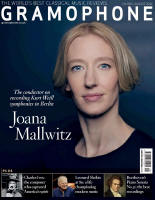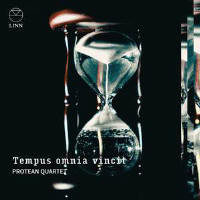Texte paru dans: / Appeared in:
|
|
|
|
|
|
Conceptually, there are multiple facets here. Taking polyphony as its starting point, the programme’s emotional crux revolves around the idea of time slipping away, from Josquin’s famous song ‘Mille regretz’, which may have been written the year before his death, to Schubert consciously writing to the tick of his own mortal clock. Simultaneously, it draws a historicalstylistic line from Purcell, one of the first composers to write for chamber string ensembles, to Schubert’s masterpieces in the genre, while also exploring the philosophical and musical idea of ‘eternal recurrence’ from the chaconne to cyclical form. The Purcell and Josquin works are all transcribed for quartet by the Protean members themselves.
The playing realises the ideas wonderfully well. The quartet sound itself combines a lovely rich sonority with a tremendous span of weight, timbre and attack; the violins have a fabulous, brightly earthy blend. The scores’ opportunities for sudden high contrasts have been plumbed to brilliant, perfectly pitched effect. The polyphony is full of personality, for example in the wonderfully coloured viola inflections in the opening Purcell Pavan, Z752; and talking of inflections, there’s an enjoyably ear-pricking shift in rhetorical inflection between the Renaissance, Baroque and Schubert. Within all this variety, the emotional narrative holds strong. I’ve loved, for instance, their skilfully worked play with silence and multiple moods of black across the central minor-tonality moments of the finale of Schubert’s Fourth Quartet, doubt softly creeping in to unsettle the youthful sparkle and foreshadow the ensuing Josquin.
Beautiful stuff, while also being something you can get your intellectual teeth into. |
|




